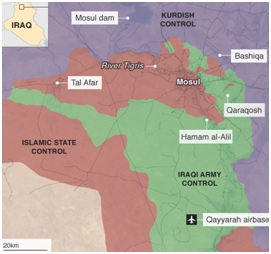The Kurdish "peshmerga" carried for years the heaviest burden of the fight against the IS with practically no military support. However, they advanced boldly and steadily from the North and Northeast on Mosul, while the Iraqi army is taking months to recapture Mosul with a very scant allied military support. The current situation of prolonged war results from the hasty and announced withdrawal of coalition troops prematurely initiated in 2011 when total victory against islamist forces was already in sight. 
Jan. 12.─ Iraqui and Western coalition commanders had promised a rapid victory in Mosul when they launched an offensive to retake the city from Islamic State (IS) in October. But the battle for Iraq’s second city has lasted three months, and Iraq’s prime minister says it will continue for at least as long again.
IS fighters initially put up stronger resistance than expected. After stalling in December, Iraq’s army has made rapid gains in the eastern half of the city over the past ten days. IS leaders have retreated to the west, blowing up the remaining bridges over the Tigris river as they left. But as the Iraqi army consolidates its hold on Mosul’s east, the siege of the west will intensify. A fresh assault across the river is not planned until early March. What is the scene on the ground—and how are the 1.1m civilians left in the divided city coping?
Aid workers returning to the neighbourhoods of eastern Mosul describe the damage as remarkably light compared to the Iraqi army’s bombardment of previous cities recaptured from IS. The army has refrained from using heavy artillery and the American-led coalition has restricted aerial bombardment. Residents, who had feared revenge attacks, speak with surprise at the Iraqi army’s discipline. Hardened human-rights observers say soldiers have not only developed a manual for protecting civilians but also applied it. Civilian casualties are low, given that the bulk of the population has stayed put. Most of those, say international officials, were inflicted by IS fighters, who fired mortar barrages at market places and shot residents trying to flee.
Yet that is as far as it goes. The army and the coalition alike seem less focused on humanitarian needs. The 700,000 people living in IS-controlled territory have been under siege since November. Stockpiles of food are running low. In the past fortnight prices have soared. Flour costs almost four times as much in the IS-controlled west as in the Iraqi-held east; sugar costs ten times as much. Inflation has yet to reach the levels seen in previous Iraqi assaults on IS-held cities; after six months of the siege of Fallujah, residents sold their cars for two bags of flour and were reduced to eating bird seed ...
[ Full text ]
Comments powered by CComment